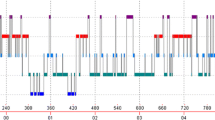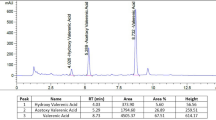Abstract
Obstructive sleep apnea (OSA) is a common sleep disorder which can result in mood problems. The aim of this study was to evaluate the severity of depression and anxiety symptoms as the most prevalent psychological disturbances present in different severity of OSA. We performed a cross-sectional study of 685 recently diagnosed sleep-disordered patients, over the age of 18, referred to Noor Sleep Lab from August 2008 to November 2010. The participants filled the Beck depression inventory-II (BDI-II) and the Beck anxiety inventory (BAI) to assess the depression and anxiety symptoms. We collected other characteristics of subjects such as age, sex, body mass index (BMI) and Epworth sleepiness scale (ESS). Apnea hypopnea index (AHI) was determined by an overnight polysomnography. Mean age of the participants was 47.63 years (SD 11.73). More than half of patient had some degrees of depression and anxiety. AHI showed no significant correlation with BDI (p = 0.105, r = −0.070) or BAI (p = 0.712, r = −0.016). Obesity was not either correlated with depression or anxiety (p = 0.18, r = 0.05). Nonetheless, ESS was weakly correlated with depression (p = 0.001, r = 0.148) and anxiety scores (p = 0.006, r = 0.120). BMI and ESS means were significantly higher in patients with severe OSA (p = 0.000). In comparison with men, the severity of depressive and anxiety symptoms was significantly higher in women (p = 0.000). In this cross-sectional study of patients with sleep problems, OSA was not associated with severity of depression and anxiety symptoms.

Similar content being viewed by others
References
Epstein LJ, Kristo D, Strollo PJ, Friedman N, Malhorta A, Patil SP et al (2009) Clinical guideline for the evaluation, management and long-term care of obstructive sleep apnea in adults. J Clin Sleep Med 5:263–276
American Academy of Sleep Medicine (2008) Obstructive sleep Apnea. Illinois: the academy
Aloia M, Bruce AS (2007) Mood and behavior. In: Kushida CA (ed) Obstructive sleep apnea: pathophysiology, comorbidities, and consequences. Informa HealthCare, New York, pp 377–392
Brown WD (2006) Neurocognitive and functional impairment in obstructive sleep apnea. In: Lee-Chiong T (ed) Sleep: a comprehensive handbook. Wiley-Liss, New Jersey, pp 279–285
Harris M, Glozier N, Ratnavadivel R, Grunstein RR (2009) Obstructive sleep apnea and depression. Sleep Med Rev 13:437–444
Sharafkhaneh A, Giray N, Richardson P, Young T, Hirshkowitz M (2005) Association of Psychiatric Disorders and Sleep Apnea in a Large Cohort. Sleep 28:1405–1411
Jackson ML, Stough C, Howard ME, Spong J, Downey LA, Thompson B (2010) The contribution of fatigue and sleepiness to depression in patients attending the sleep laboratory for evaluation of obstructive sleep apnea. Sleep Breath 15:439–445
Saunamaki T, Jehkonen (2007) Depression and anxiety in obstructive sleep apnea syndrome: a review. Acta Neurol Scand 116:277–288
Bardwell WA, Berry CC, Ancoli-Israel S, Dimsdale JE (1999) Psychological correlates of sleep apnea. J Psychosom Res 47:583–596
Pillar G, Lavie P (1998) Psychiatric symptoms in sleep apnea syndrome: effects of gender and respiratory disturbance index. Chest 114:697–703
Kjelsberg FN, Ruud EA, Stavem K (2005) Predictors of symptoms of anxiety and depression in obstructive sleep apnea. Sleep Med 6:341–346
El-Ad B, Lavie P (2005) Effect of sleep apnea on cognition and mood. Int Rev Psychiatry 17:277–282
Andrews JG, Oei TPS (2004) The roles of depression and anxiety in the understanding and treatment of obstructive sleep apnea syndrome. Clin Psychol Rev 24:1031–1049
Beck AT, Ward CH, Mendelson M, Mock J, Erbaugh J (1961) An inventory for measuring depression. Arch Gen Psychiatry 4:561–571
Beck AT, Epstein N, Brown G, Steer RA (1988) An inventory for measuring clinical anxiety: psychometric properties. J Consult Clin Psychol 56:893–897
Ghassemzadeh H, Mojtabai R, Karamghadiri N, Ebrahimkhani N (2005) Psychometric properties of a persian-language version of the Beck depression inventory-second edition: BDI-II-Persian. Depress Anxiety 21:185–192
Kaviani H, Mousavi AS (2008) Psychometric properties of the Persian version of Beck anxiety inventory (BAI). Tehran Univ Med J 65:136–140 (Farsi)
Beck Depression Inventory Scoring. Mental Health Research Centre, Tehran Psychiatric Institute (Iran). http://mhrn.net/template/farsi/index.aspx. Accessed 15 December 2010
Beck Anxiety Inventory Scoring. Mental Health Research Centre, Tehran Psychiatric Institute (Iran). http://mhrn.net/template/farsi/index.aspx. Accessed 15 December 2010
American Academy of sleep medicine (2005) 2nd edn. Westchester, III: American Academy of Sleep Medicine; International classification of sleep disorders: diagnostic and coding manual
Talaei A, Fayyazi BMR, Rezaei AA (2009) Depression and its correlation with self-esteem and social support among Iranian university students. Iranian J Psychiatry 4:17–22
Sadeghi M, Navidi M, Sadeghi AE (2007) Depression among resident doctors in Tehran, Iran. Iranian J Psychiatry 2:50–52
Kaviani H, Abhari AA (2003) Prevalence of anxiety disorders in Tehran city. Iranian J Psychiatry Clin Psychol 3:4–11 (Farsi)
Macey PM, WOO MA, Kumar R, Cross RL, Harper RM (2010) Relationship between obstructive sleep apnea severity and sleep, depression and anxiety symptoms in newly-diagnosed patients. PLoS ONE 5:e10211. doi:10.1371/journal.pone.0010211
Sforza E, Hilaire ZS, Pelissolo A, Rochat T, Ibanez V (2002) Personality, anxiety and mood traits in patients with sleep-related breathing disorders: effect of reduced daytime alertness. Sleep Med 3:139–145
Aloia MS, Arnedt JT, Smith L, Skrekas J, Stanchina M, Millman RP (2005) Examining the contrast of depression in obstructive sleep apnea syndrome. Sleep Med 6:115–121
Riha RL (2010) Clinical assessment of the obstructive sleep apnoea/hypopnoea syndrome. Ther Adv Respir Dis 4:83–91
Kapur VK, Baldwin CM, Resnick HE, Gottlieb DJ, Nieto J (2005) Sleepiness in patients with moderate to severe sleep-disordered breathing. Sleep 28:427–477
Piccinelli M, Wilkinson G (2000) Gender differences in depression. Br J Psychiatry 177:486–492
Conflict of interest
The all authors declare that they have no conflict of interest. This paper was not financially supported or indorsed by any business or company.
Author information
Authors and Affiliations
Corresponding author
Rights and permissions
About this article
Cite this article
Asghari, A., Mohammadi, F., Kamrava, S.K. et al. Severity of depression and anxiety in obstructive sleep apnea syndrome. Eur Arch Otorhinolaryngol 269, 2549–2553 (2012). https://doi.org/10.1007/s00405-012-1942-6
Received:
Accepted:
Published:
Issue Date:
DOI: https://doi.org/10.1007/s00405-012-1942-6




